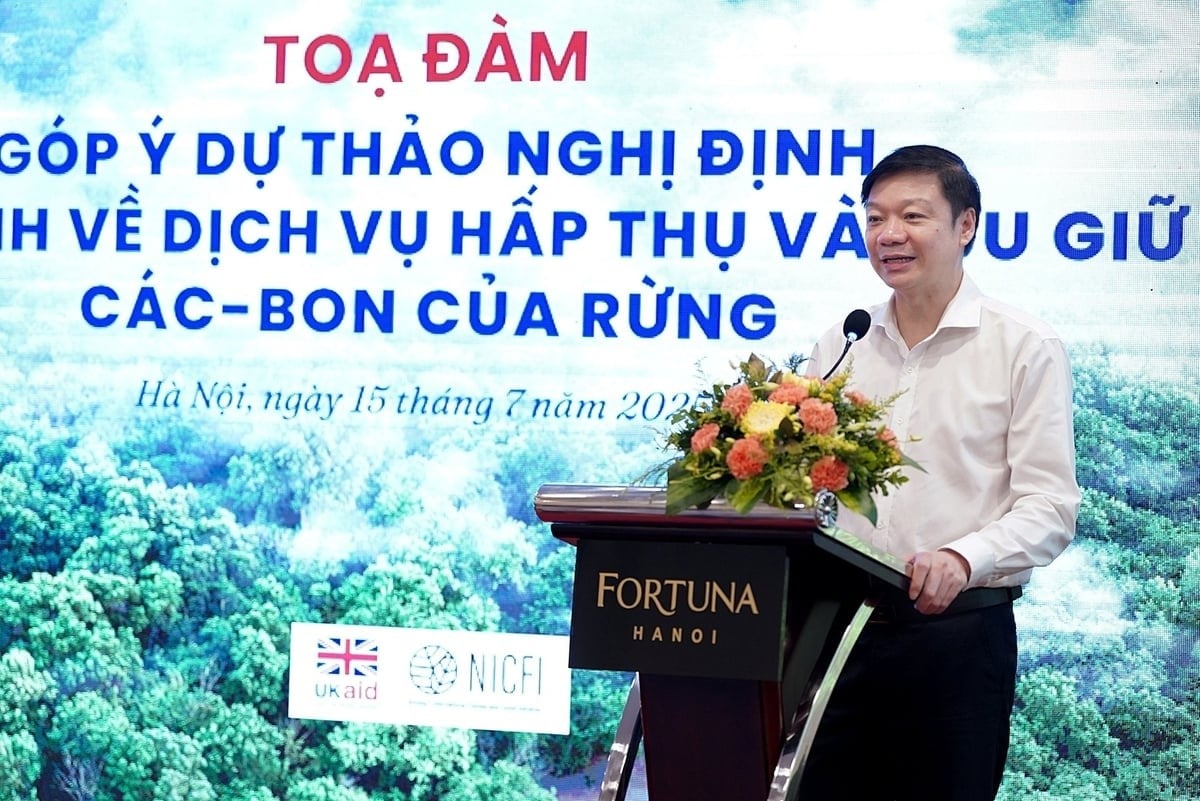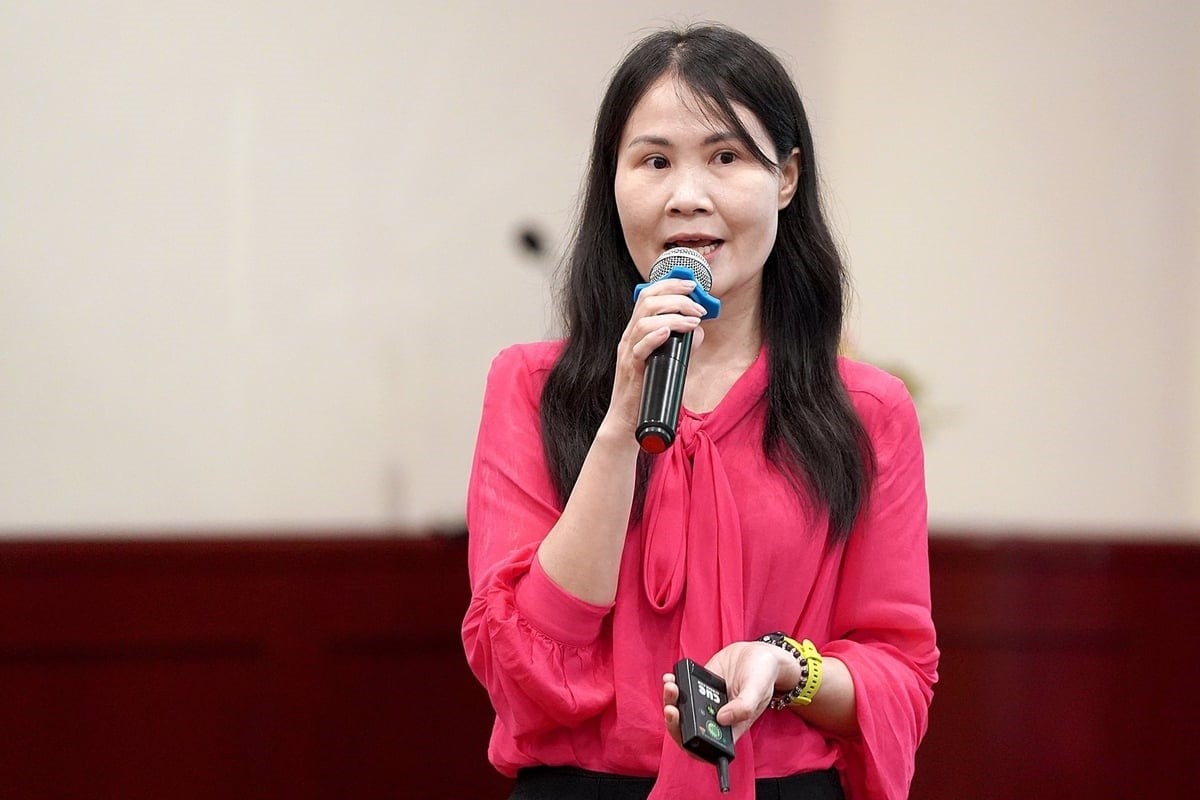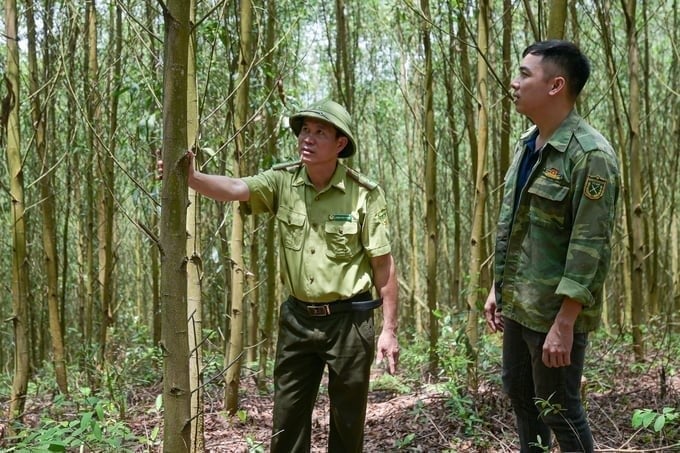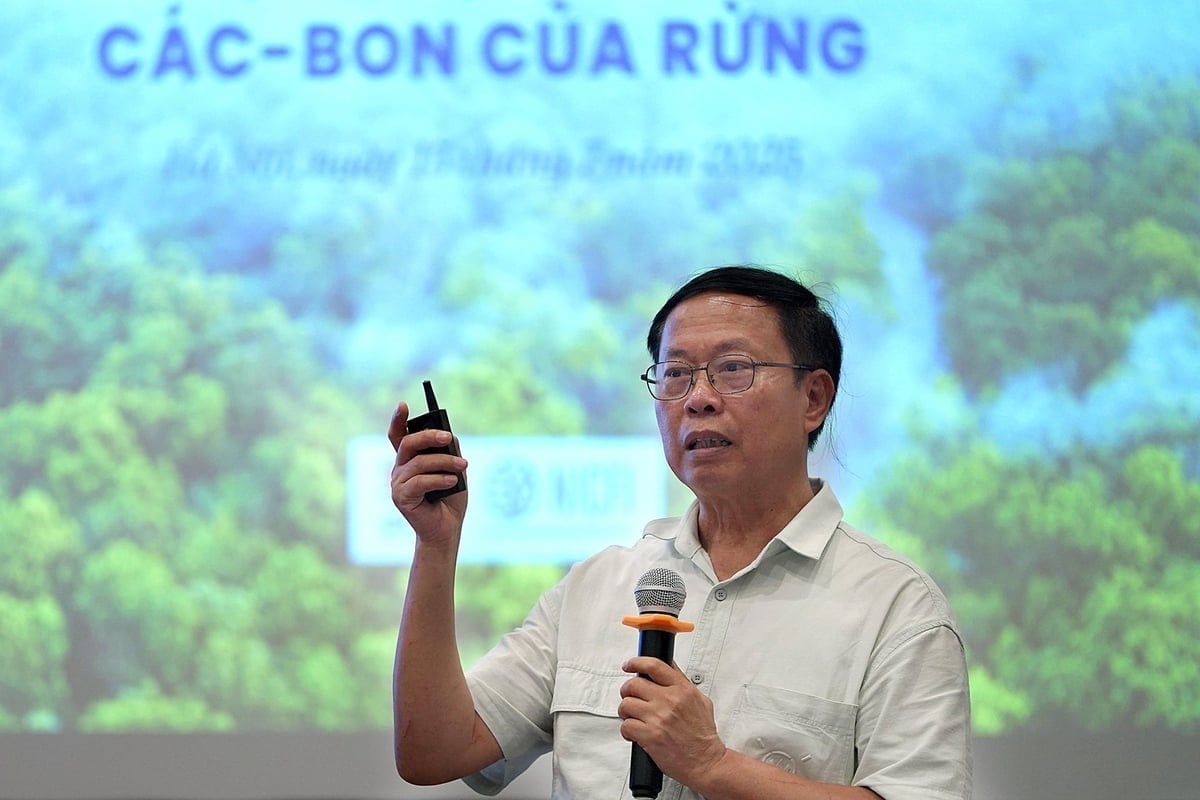December 16, 2025 | 22:37 GMT +7
December 16, 2025 | 22:37 GMT +7
Hotline: 0913.378.918
December 16, 2025 | 22:37 GMT +7
Hotline: 0913.378.918
On July 15, the Vietnam Forest Owners Association, in collaboration with Forest Trends, held a consultation workshop on the Draft Decree on Forest Carbon Sequestration and Storage Services. At the workshop, Ms. Nghiem Phuong Thuy, a representative from the Department of Forestry and Forest Protection, stated that the current draft is a step towards completing the legal framework to concretize Vietnam's commitments to reducing greenhouse gas emissions in the forestry sector, especially following the country's declaration of a net-zero emissions target by 2050.

According to Director General Tran Quang Bao, the decree, once issued, will 'untie' carbon credit holders. Photo: Bao Thang.
The draft decree comprises four chapters and 18 articles, covering the determination of emission reduction results, the volume of forest carbon credits for supply, implementation arrangements, revenue management, and payment mechanisms. This is the first time Vietnam has developed domestic standards for forest carbon, in parallel with mechanisms for certifying credits under international standards.
One notable new provision is the clear designation of service providers, which may include state forest owners (such as commune-level People's Committees and public organizations) or private entities (individuals, households, residential communities, and businesses). Service users are domestic and foreign organizations or individuals seeking to offset carbon emissions.
The exchange and transfer of emission reduction results or forest carbon credits shall be conducted through contracts or domestic carbon trading platforms. The value of the credits is calculated based on one ton of CO2e, with the starting price set by the provincial People's Committee in accordance with guidance from the Ministry of Agriculture and Environment.
For forests under all-people ownership, the provincial People's Committee or the Ministry of Agriculture and Environment will act as the representative to implement forest carbon projects. In contrast, for forests under the use rights of individuals, organizations, or communities, the forest owners may directly participate or authorize a legally qualified unit to carry out the project. Particularly, households or individuals owning planted forests adjacent to the province's projects may voluntarily participate, have their forest areas officially recognized, and receive benefit-sharing from the emission reduction results.

Ms. Nghiem Phuong Thuy presents key highlights of the draft Decree on Forest Carbon. Photo: Bao Thang.
Revenues from the sale of carbon credits will be distributed either through direct payments or via the Vietnam Forest Protection and Development Fund and provincial-level funds. For forest owners that are organizations, the income after deducting related expenses will be considered legal revenue and used in accordance with current financial regulations. For individuals, households, or communities, revenues will be allocated based on the forest area contributed to and used according to the approved plan.
Forest owners, commune-level People's Committees, and relevant organizations will be required to submit annual reports to provincial funds and higher-level authorities to ensure publicity and transparency. Financial monitoring and inspection will follow the provisions of Article 72, Decree No. 156/2018/ND-CP.
Additionally, the Ministry of Agriculture and Environment will be the focal point for providing guidance on pricing, developing forest carbon standards, and establishing the measurement, reporting, and verification (MRV) system. The Ministry of Finance will coordinate in developing methods for determining service pricing. Provincial People's Committees are responsible for implementation, contract signing, and reporting results within their authority.
According to Ms. Thuy, the issuance of the decree is essential in the context of growing international demands for transparency in emission reduction efforts. It also opens up opportunities to mobilize additional financial resources for forest protection and development in Vietnam. Moreover, the decree is also a prerequisite for Vietnam’s forest carbon credits to participate in global voluntary carbon markets such as LEAF or FCPF.

Staff from the Luc Ngan Forest Protection Station patrols the local forest area. Photo: Tung Dinh.
Hoping that the new decree will “untie” forest owners who may hold carbon credits in the future, Dr. Nguyen Ba Ngai, Vice President and Secretary-General of the Vietnam Forest Owners Association, proposed a clear separation between the service provision mechanism and the carbon trading market to ensure transparency and alignment with current legal frameworks on environmental protection and forestry.
According to Mr. Ngai, the service provision mechanism should be approached as a civil–contractual relationship in which forest carbon credits are transacted between providers (forest owners) and users (emitting enterprises) through agreements with State-regulated pricing. This approach is similar to the existing Payment for Forest Environmental Services (PFES) mechanism, ensuring the interests of all parties and establishing a clear legal corridor for local people and communities.
In contrast, under a market-based mechanism, forest carbon credits would be put on trading floors, where businesses could independently exchange, offset emissions, or buy and sell credits based on their needs. In this case, the State should not intervene in pricing, allowing credit prices to be determined by market principles or through auctions. This approach is consistent with the provisions of Decree No. 06/2022/ND-CP and Decree No. 119/2025/ND-CP on greenhouse gas emissions reduction and carbon market development.

Mr. Ngai hopes the decree will help forest owners proactively participate in the carbon market. Photo: Bao Thang.
Mr. Ngai emphasized, “If these two mechanisms are not clearly separated, it may easily lead to conflicts over pricing methods and benefit-sharing, posing challenges during implementation. Harmonizing the legal basis between the Law on Forestry 2017 and the Law on Environmental Protection 2020 is critically important.”
Another aspect that requires adjustment is the draft's terminology. Mr. Ngai suggested using the terms “forest carbon” or “carbon gases” instead of “greenhouse gases” to reflect the nature of the service being addressed more accurately.
As the representative organization for forest owners, Mr. Ngai expressed hope that the upcoming decree will establish a clear and favorable legal corridor, allowing individuals, communities, and forestry enterprises to participate in the carbon market proactively. This is not only an opportunity to attract additional financial resources for forest protection and development but also a driving force for the forestry sector to contribute to Vietnam’s net-zero emissions commitment by 2050.
Dr. Tran Quang Bao, Director General of the Department of Forestry and Forest Protection, affirmed that the draft decree is built upon the legal framework of Decree No. 06/2022/ND-CP, with the goal of providing maximum support to forest owners, particularly in simplifying procedures and facilitating participation in the carbon market. He emphasized that once issued, the decree will “untie” carbon credit holders, allowing them greater autonomy in exchanging, transferring, or offsetting credits not only domestically but also with international partners.
According to Mr. Bao, some notable provisions in the draft include pricing regulations for carbon credits, which may follow direct negotiation or voluntary mechanisms similar to the current ERPA model. In addition, the draft aims to strongly encourage participation from the private sector and businesses, which are stakeholders with financial and technological capacities, to increase forest carbon stocks. This practically contributes to the objectives of sustainable forestry development and the fulfillment of Vietnam's climate pledges.
Translated by Thu Huyen

(VAN) Trading forest carbon credits is to reduce greenhouse gas emissions while creating sustainable livelihoods for local communities.

(VAN) Expanding the area of forests with FSC certification creates a foundation for elevating the economic value of forests, promoting sustainable management, and offering opportunities to participate in the carbon credit market.

(VAN) MAE and GIZ organized the conference to strengthening capacity and readiness for EUDR implementation in Vietnam.

(VAN) When women, men, children, and people with disabilities all have the opportunity to maximize their potential, the economy will grow, and the country will prosper.

(VAN) Effective disaster prevention and the creation of sustainable livelihoods through practical forestry policies are the distinct and crucial values of special-use and protection forests.

(VAN) The policy movement regarding carbon emission reduction is opening up a new approach, linking national goals with practical agricultural production.

(VAN) Deputy Prime Minister Tran Hong Ha made this request at the 24th meeting of the National Steering Committee for Combating IUU Fishing with 21 coastal provinces and cities joining virtually.